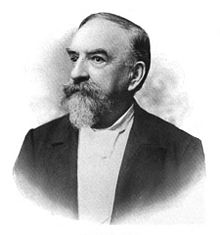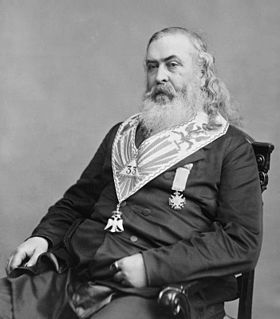
Albert Pike was an American author, poet, orator, jurist and prominent member of the Freemasons. He was also a senior officer of the Confederate States Army who commanded the District of Indian Territory in the Trans-Mississippi Theater of the American Civil War.

Thomas C. Hindman was a lawyer, United States Representative from the 1st Congressional District of Arkansas, and Major-General in the Confederate States Army during the American Civil War.

Powell Foulk Clayton was an American politician and diplomat who served as a Radical Republican Governor of Arkansas during the Reconstruction Era from 1868 to 1871, a United States Senator from Arkansas from 1871 to 1877 and as United States Ambassador to Mexico from 1899 to 1905. He was an officer in the Union Army during the U.S. Civil War, fought in battles in Missouri and Arkansas and was promoted to Brigadier General. Clayton retired to Eureka Springs, Arkansas and promoted the development of the resort town through his activity in the Eureka Springs Improvement Company and the Eureka Springs Railroad.

Thomas James Churchill was an American politician who served as the 13th governor of Arkansas from 1881 to 1883. Prior to that, he was a senior officer of the Confederate States Army who commanded infantry in the Western and Trans-Mississippi theaters of the American Civil War.

The Brooks–Baxter War was an armed conflict in Little Rock, Arkansas, in the United States, in 1874 between factions of the Republican Party over the disputed 1872 state gubernatorial election. The victor in the end was the "Minstrel" faction led by Elisha Baxter over the "Brindle Tail" faction led by Joseph Brooks.

Elisha Baxter was the tenth Governor of the State of Arkansas.

James Philip Eagle was an American politician who served as the 16th Governor of Arkansas and president of the Southern Baptist Convention.
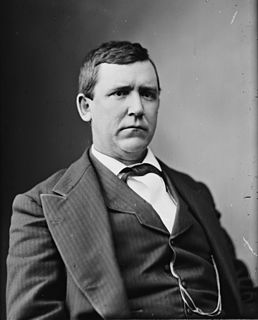
Augustus Hill Garland was an American lawyer and Democratic politician from Arkansas, who initially opposed Arkansas' secession from the United States, but later served in both houses of the Congress of the Confederate States and the United States Senate, as well as became the 11th Governor of Arkansas (1874-1877) and the 38th Attorney General of the United States (1885-1889).

James Fleming Fagan was a planter, public official, and a Major General in the Confederate States Army during the American Civil War. His Arkansas brigade distinguished itself in the Red River Campaign of 1864, helping to drive the Union army from southern Arkansas.

Albert Rust was an American politician who served as a delegate from Arkansas to the Provisional Congress of the Confederate States from 1861 to 1862. A member of the Democratic Party, Rust was the U.S. Representative from Arkansas's 2nd congressional district, serving from 1859 to 1861. Rust also served as a senior officer of the Confederate States Army during the American Civil War.
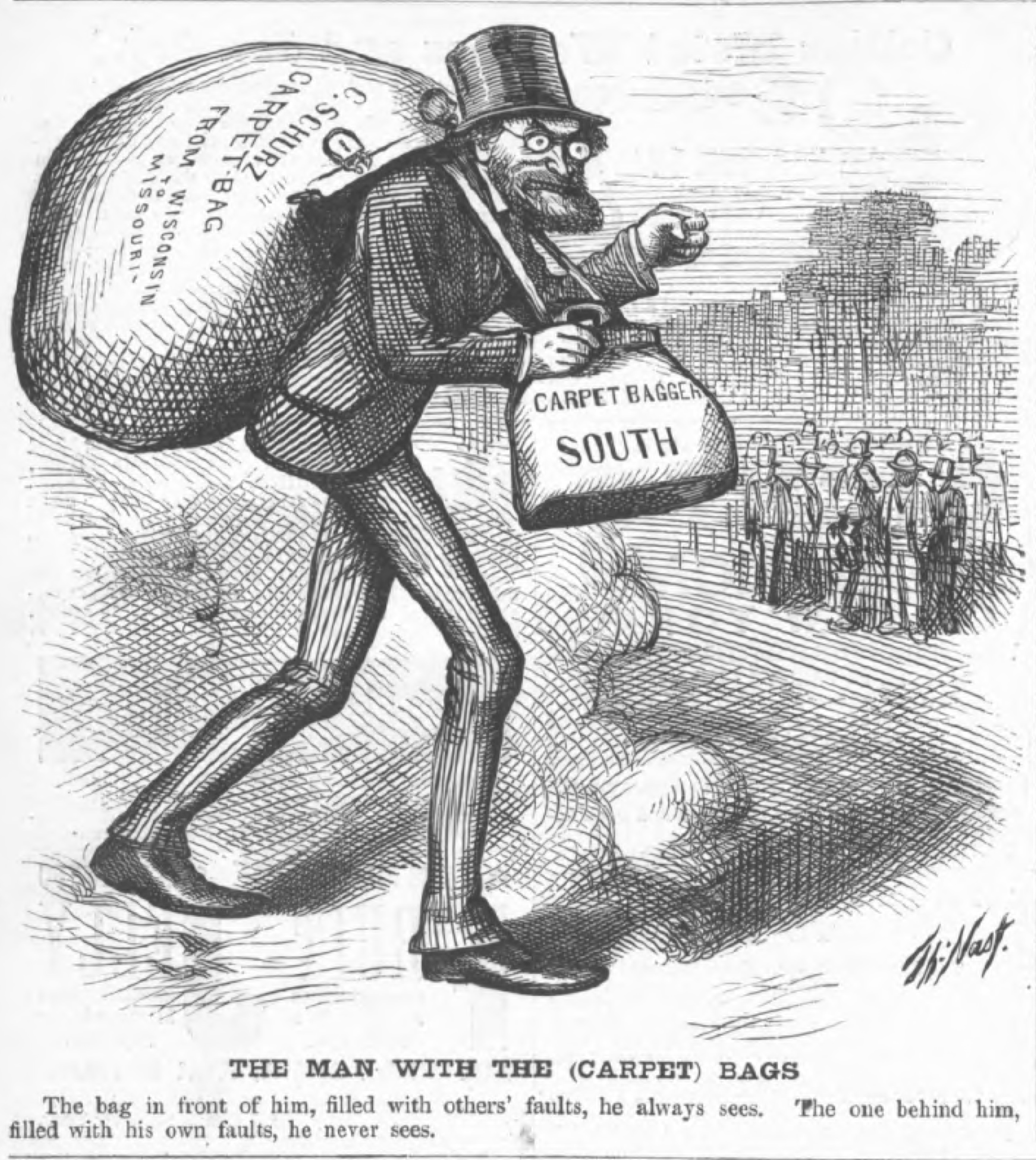
In the history of the United States, carpetbagger was a derogatory term applied by former Confederates to any person from the Northern United States who came to the Southern states after the American Civil War; they were perceived as exploiting the local populace. The term broadly included both individuals who sought to promote Republican politics, and those individuals who saw business and political opportunities because of the chaotic state of the local economies following the war. In practice, the term carpetbagger was often applied to any Northerner who was present in the South during the Reconstruction Era (1863–1877). The term is closely associated with "scalawag", a similarly pejorative word used to describe native White southerners who supported the Republican Party-led Reconstruction.

The Arkansas National Guard comprises both the Arkansas Army National Guard and Arkansas Air National Guard. The state functions of the National Guard range from limited actions during non-emergency situations to full scale law enforcement of martial law when local law enforcement officials can no longer maintain civil control. The National Guard may be called into federal service by the President.
Joseph Brooks was a Republican politician in Arkansas during the Reconstruction era after the American Civil War. He is mainly remembered for losing the 1872 gubernatorial race, after which he led in 1874 a coup d'état, now referred to as the Brooks–Baxter War. The confrontation failed, as his intra-party rival, Elisha Baxter remained in office.

During the American Civil War, Arkansas was a Confederate state, though it had initially voted to remain in the Union. Following the capture of Fort Sumter in April 1861, Abraham Lincoln called for troops from every Union state to put down the rebellion, and Arkansas and several other states seceded. For the rest of the war, Arkansas played a major role in controlling the vital Mississippi River and neighboring states, including Tennessee and Missouri.
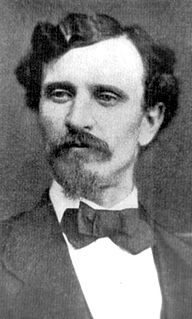
John Middleton Clayton was an American politician who served as a Republican member of the Arkansas House of Representatives for Jefferson County from 1871 to 1873 and the Arkansas State Senate for Jefferson County. In 1888, he ran for Congressman but lost to Clifton R. Breckinridge. Clayton challenged the results and was assassinated in 1889 during the challenge to the election. He was declared the winner of the election posthumously. The identity of his assassin remains unknown.
The history of Arkansas began millennia ago when humans first crossed into North America. Many tribes used Arkansas as their hunting lands but the main tribe was the Quapaw, who settled in Arkansas River delta upon moving south from Illinois. Early French explorers gave the territory its name, a corruption of Akansea, which is a phonetic spelling of the Illinois word for the Quapaw. This phonetic heritage explains why "Arkansas" is pronounced so differently than "Kansas" even though they share the same spelling. What began as a rough wilderness inhabited by trappers and hunters became incorporated into the United States as part of the Louisiana Purchase in 1803 and became Arkansas Territory in 1819. Upon gaining statehood in 1836, Arkansas had begun to prosper under a plantation economy that was heavily reliant on slave labor. After the Civil War Arkansas was a poor rural state based on cotton. Prosperity returned in the 1940s. The state became famous for its political leadership, including President Bill Clinton, and as the base for the Walmart Corporation.

Robert C. Newton was a noted lawyer and Confederate Colonel in Arkansas during the American Civil War. He is most remembered for his involvement in the Brooks-Baxter War. Robert C. Newton Camp # 197 of Little Rock was named for him and was the oldest continually run camp of the Arkansas Division, Sons of Confederate Veterans, as well as the oldest continually active camp west of the Mississippi River.

The Arkansas Militia in Reconstruction was deeply involved in the ongoing civil disturbances which plagued the state until the late 1870s. In the immediate aftermath of the Civil War, the militia was first utilized by the white population to re-establish control over the newly freed black population. Radical Republicans seized control in 1867 and abolished existing state governments and militia organizations, and disenfranchised former Confederates. The new disenfranchised whites turned to the shadow Ku Klux Klan to attempt to maintain social order. The Re-constructionist government raised a new militia, primarily of black soldiers with white officers and utilized this new "Black Militia" to put down the rising power of the Ku Klux Klan. Armed conflicts between rival parties continued in several counties and the Militia was called to re-establish control in Pope and Scott Counties. The most severe conflict of this period occurred during the so-called Brooks–Baxter War with rival parties, with supporting militias, battling for control of the governorship. With the end of reconstruction one of the first acts of the new resurgent Democratic state legislature was to abolish the office of Adjutant General in retaliation for the use of the militia to enforce the rule of the Reconstruction government.

Robert Glenn Shaver was an American lawyer, militia leader, and colonel in the Confederate States Army during the American Civil War. He served in several key battles in the Western Theater. After the war, he was an early leader of the Ku Klux Klan in Arkansas. Later in life, he became a significant leader in Confederate veterans' reunions and served for a time as the Major General in Command of the Arkansas State Guard.
The Skirmish at Terre Noire Creek, sometimes called the Skirmish at Wolf Creek or Skirmish at Antoine, an engagement during the Camden Expedition of the American Civil War, was fought on April 2, 1864. The action occurred about 1 mile (1.6 km) east of Terre Noire Creek along a defile near the towns of Hollywood, Arkansas and Antoine, Arkansas. A Confederate States Army cavalry brigade under Brigadier General Joseph O. Shelby attacked a Union supply train of more than 200 wagons accompanying Union Army Major General Frederick Steele's force which was attempting to reach Shreveport, Louisiana to join with Major General Nathaniel Banks's force in the Red River Campaign with the objective of occupying Shreveport and controlling western Louisiana.
